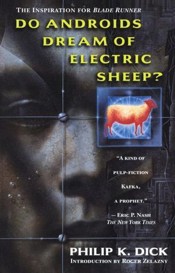Do Androids Dream of Electric Sheep?

(This is the book that was the inspiration for the 1982 movie Blade Runner. The association is very loose, through. The movie and the book have little in common.)
This is “philosophical science fiction.” It describes a modified reality which raises all sorts of interesting questions.
The setting is a post-apocalyptic Earth where most living things have died. The government wants humanity to emigrate to Mars. Life-like androids have been developed, and if you move to Mars, you get one for free as a servant.
Unfortunately, the “andys” are a little too lifelike. They are sentient, and don’t understand why they’ve been enslaved. Some don’t even know they’re androids – they have false memories of a childhood. And some of them escape slavery on Mars, and travel to Earth.
Rick Dekkard is a bounty hunter (in the movie, they call him a “Blade Runner,” but that term doesn’t appear anywhere in the book). It’s his job to find androids who have entered Earth, and “retire” them.
And this is the philosophical part –
If something is indistinguishable from a human, and it has memories of a childhood, and it thinks it’s alive…is it alive? Is it fair to “retire” it? If something believes it is alive, then is it? What is life? Dekkard is tortured by these questions.
That’s the crux of it. It’s short, and compelling reading. I’m not giving it five stars, because I feel like it gets a little muddled in the end. It gets so overwhelmed by its “philosophical-ness” that it sort of meanders aimlessly. And there are some vague subplots involving the desirability of real animals (as opposed to android animals) and a strange religion called “Mercerism.”
But, a good book overall. It’s not a huge time investment – just 240 pages, and lots of dialog, so it reads quickly. I’m glad I read it.
Book Info
- I have read this book. According to my records, I completed it on .
- A softcover copy of this book is currently in my home library.